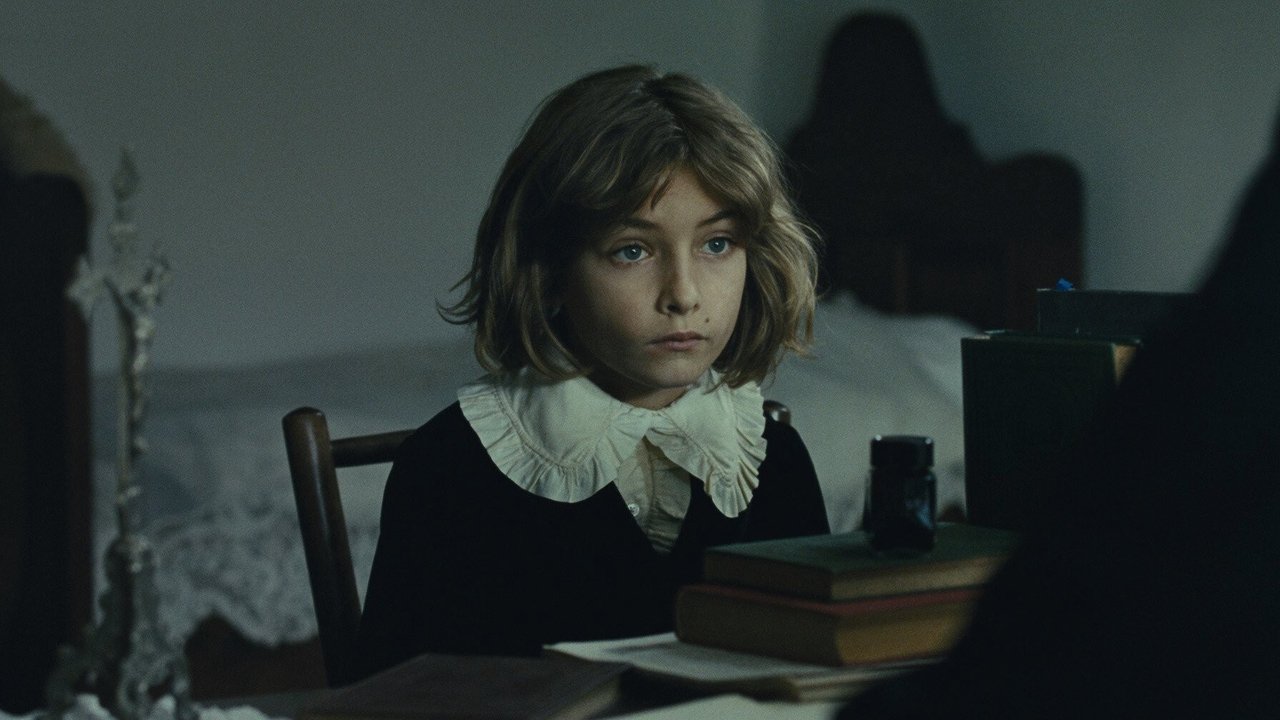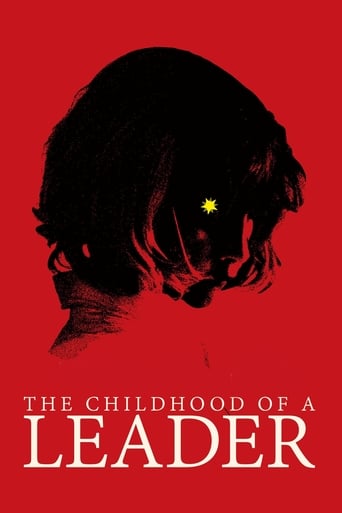

A chronicle of the childhood of a post-World War I leader. The fact that i even wasted 1 hour and 56 minutes of my life in this film makes me a pretty dumb person to be honest. I do like some of the actors that star in this film like Liam Cunningham, Robert Pattinson and even Stacy Martin. But the movie doesn't give to anyone any actual chance to prove their actual talent i mean common? What was even the purpose to have Robert Pattinson in this movie? He doesn't do anything he is useless and the fact that he plays even a 2nd role the role of the Leader makes no sense at all and what makes it even worse it's how fake the beard and his bold head look like. The parents of Prescott both pretty much suck at Parenting especially his Father he doesn't even try to come closer with his son and the same goes for his Mother even the characters that i thought were at least decent like Mona and the Teacher even those turned out to be pretty screwed up and the entire film makes no freaking sense it doesn't have a script, a story and it definitely doesn't have a good director, the movie has all those boring long shots of people walking up and down stairs with some pretty good music (the only good thing about the movie) playing in the background in scenes that aren't even supposed to be epic. The first 59 to 60 minutes were kinda and i say kinda half decent but once the film started going for one hour it started going downhill with some pretty dumb hilarious dialogue like the mother saying "i'm bleeding" when clearly she isn't as her husband touches her and his response is like "i'm not in mood anymore bye" seriously stuff like that actually happen in the movie. And Prescott's behavior doesn't even make that much of a sense on it's own he is just running around and he either stays in his room without eating or just falls down a couple of times. Plus the final shot of the film is the most dizzy and stupid scene i have seen in a movie in years it makes Paul Greengrass shaky cam look like a Masterpiece. Overall this movie did start kinda promising and like i said the soundtrack was pretty good and even haunting at times but it's used in moments that shouldn't even have music like that i would advice you to never seen this movie. (1/10)
... View MoreThis is a Initially it seems an interesting and dark movie, but the course of the film it is clear that the script and the dialogues have no rhyme or reason.The idea of the script is interesting, but unfortunately it's just an idea. Many points are left open in the story that is essentially weak. The main character who is a kid is pretty dumb and it is impossible to know how he evolves into a supposed leadership. The soundtrack is higher than the dialogues and compete with each other. The only thing that is reasonable is photography, which brings a dull and tense atmosphere. I saw this movie without consulting the opinions of IMDb. Otherwise I would not have seen it. It's just a waste of time.
... View MoreNot convinced by the movie. Some here say that the photography is good: I'd say that it's overly sombre, giving a sense of foreboding that never get realised. The place of the action is unrealistically shabby, which gets out of place with the proposed occupation of the father, and speaks of a miserable childhood, where it seems the realisator wanted to show a born psychopath revealing himself. This part is the most perturbing of all: I may be influenced by my readings, but it seems to me that either this child is not beaten up enough (to become an actual psychopath) or the realisator still thinks that babies are born dictators.... which is against all scientific knowledge on actual childhoods of actual dictators, including GW Bush.The movie is heavily alluding to the rise of a famous early XXth century German leader, but lacks realism if this is the actual model: A. Hitler has been considerably beaten up, living with a mother who had to get over various infant deaths (alluded in the film with the scene of the bed and missed love)without support, while his father had a much more violent attitude towards him and cultivated the secret and shame upon his origins. The movie describes uncaring parents, without ever getting in line with what we know of the infancies of, say, Staline or Sadam Hussein or said German leader, without even getting close to what educative violence was in those years post WWI in Europe (or sadly still is sometimes in the US). Some side plots are not used to their full extent (the dismissal of the carer, the would-be affair between the father and the repetitor), the relationship between mother and son is only rougly drafted, but never gets to its full extent (eg: a sick sensual relationship is half suggested between the mother and the son, by his girl attire-also an allusion to a famous Hitler picture?-, or his mother exclusive attention), The sexual repression of young Prescott could have been exploited more -didn't 19th century Americans widely used circumcision as a way to make sex hurtful?- the young Prescott relations -or lack thereof- with the other village kids could have been used) As it is, the movie goes along the line: "young kid feels alone, gets trashed once, gets sexually aroused by his repetitor, who scolds him, hits his mother and becomes sadistic leader. This may seems a bit lame for anyone with a superficial knowledge of European history (Europe, land of horror stories)
... View MoreThis movie might have been decent if I was able to actually decipher some of the dialogue. The French was not subtitled and it was spoken through at least half the movie. The English was whispered behind music that was entirely too loud. But what bothered me most is there was not enough "story". Why did he have mental health issues? His mother seemed to love him, he was cared for by people close to him. He was not poor or abused, give me something! There is not even enough for me to provide a decent speculation. I think it could have been so much better, as much as I wanted to like it, I did not. The music tried to make it more suspend up than it actually was. The people that say this was "art" are just lame and use that as an excuse to give it better reviews. This movie had no substance and no matter how you try and describe it, the fact of the matter is that it doesn't!
... View More